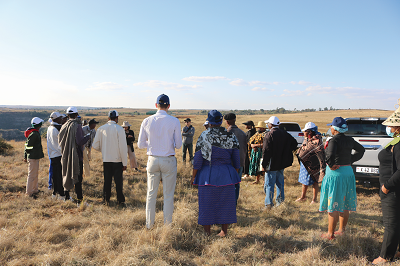By T’soloane Mohlomi
MASERU – The Ministry of agriculture through the Wool and Mohair Promotion Project recently sensitized stake holders and farmers on the importance of rangeland sustenance, coupled with the various deployable methods of ensuring pastoral maintenance.
The conference dubbed-International Dialogue on Climate Smart Rangeland Management was under the theme “Sustainable use of rangeland resources for improved livelihoods in the era of climate change.”
With The Kingdom of Lesotho’s picturesque scenery consisting of various wetlands and valleys, which include a collage of pastoral lands essential for animal grazing, and as the kingdom, relies heavily on agriculture as a key sector with the potential to stimulate its ailing economy – the maintenance of rangelands has thus proved essential for an optimistic future.
In latter times however, the state of pastoral lands is mismanaged and has begun deteriorating by the day, should this continue, the country will see an overwhelming decline in the number of fertile rangelands in the future.
With the Lesotho National Wool and Mohair Growers Association’s (LNWMGA) 130 mohair depots having produced earnings running into millions in the year 2021 and 2022, the lucrative profits are sure to dip if rangeland mismanagement isn’t addressed.
In the background of the aforementioned challenges confronting farmers and animal breeders alike (particularly breeders of cattle, sheep and goats) in Lesotho, chairman of the Lesotho National Wool and Mohair Growers Association, Mr Mokoenihi Thinyane, speaking at the conference, said sadly their needs as stakeholders in this conversation has not been addressed.
Mr Thinyane particularly highlighted and raised concerns over the legislature utilized to regulate issues concerning the use and conservation of rangelands. He said authorities often enacted laws without consulting them and at a later stage would (or even at the very last) attend to them with the will and vigour to enforce those very same laws in which they were never consulted about. He said most of the time the laws were irrelevant to their actual needs.
The association leader said, in actual fact rangelands would be well off regulated by the introduction of a monetary fine exclusive to farmers who utilized the pastures for animal grazing. He said this special “rangeland fine” would deter the misuse of fertile grazing lands by farmers who usually reared “undomesticated” animals like herds of horses which wondered about without supervision exploiting fertile rangelands.
“It has been long since we as farmers have suggested to government that a rangeland fine be introduced for farmers who often misused and exploited grazing pasture. But it is indeed evident to us till this day that politicians and those in authority, have really desist talking about this issue and have continuously deferred it because most of them fear losing support during electoral campaigning especially in the highlands where famers reside, he said.
“I remember in 1993 the American government proposed a law that would ensure that rangelands would be barricaded and protected and local farmers would then leave their animals in the barricaded areas where the animals would be taken care of and supervised by professionals and experts from farming companies, this law would have been beneficial to us and it would have subsequently ended the scourge of stock theft because the animals would be guarded by professional armed security.
“But so unfortunately a certain local politician erased the bill overnight, and the following day he announced that the bill was no more and had been annulled, the Americans with their equipment and bright ideas up and left. Those are the types of problems our country faces.
Another issue raised was the challenge that farmers face in the country whereby international wool and mohair buyers and animal rights organizations are now breathing under their necks enforcing a prerequisite that every wool and mohair depot in Lesotho have a certificate which can be awarded to farmers only upon ensuring that the wool and mohair produced, is produced under healthy and favourable conditions for the animals, the animals are protected from harsh weather conditions, and that herd boys and men are treated well and taken care of.
Mr Thinyane continued saying the aforementioned issue remained an obstacle as current conditions for a large number of famers did not comply with the stipulated guidelines.
In mitigating the scourge of rangeland mismanagement and presenting creative options in sustaining its management for improved livelihoods in the era of climate change, speaking on behalf of the Food and Agricultural Organization (FAO) Mr Khotso Mathafeng said that his organization had created a land cover dashboard whereby any party could select an area of interest for specific information regarding the land and its suitability for agricultural purposes. He said the data is categorized in different levels be it district level or international level, the dashboard also provides credible statistics and even highlights different zones that the country is divided into.


